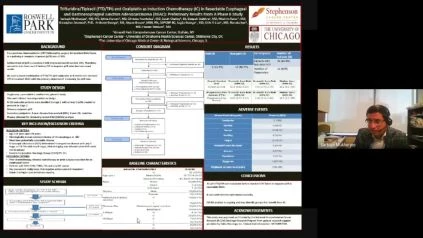Sarbajit Mukherjee, MD, MS, Assistant Professor, Roswell Park Comprehensive Cancer Center conducted a study to investigate the efficacy of a novel treatment approach for localized esophagogastric adenocarcinoma (EGAC). The standard treatment of pre-operative chemoradiation (CRT) followed by surgery leads to a pathologic complete response (pCR) rate of 20%. However, achieving pCR is associated with improved overall survival (OS). In this study, physicians aimed to increase the pCR rate by administering an innovative combination of FTD/TPI and oxaliplatin as induction chemotherapy (IC) prior to standard CRT.
Between January 2020 and October 2022, patients eligible for potentially curative surgery with EGAC were enrolled in this open-label, single-arm, multicenter, phase II trial. Eligible patients had adequate organ function, an ECOG performance status of 0-1, age below 76 years, and EUS-determined node-positive disease. The patients received three cycles of IC with FTD/TPI and oxaliplatin, followed by concurrent CRT and subsequent surgery.
The primary objective of the study was to evaluate the pCR rate, while secondary objectives included assessing 2-year disease-free survival (DFS), 2-year OS, and treatment toxicities. A Simon two-stage design was implemented, and 22 evaluable patients were enrolled in stage 1. If at least 5 patients achieved pCR, the study would proceed to stage 2. Blood samples were collected at various time points to measure circulating tumor DNA (Ct DNA) as a correlative endpoint. The clinical trial registration number is NCT04097028.
Out of the 22 enrolled patients, 86.4% were male, and 90.9% were Caucasian. The median age was 61 years, with 54.5% of patients having a primary disease at the gastroesophageal junction. The majority (90.9%) had T3 disease, and 68.2% had node-positive disease by EUS. Prior to CRT, IC resulted in a 35% or greater reduction in SUVmax in 60% of patients.
At the time of data cutoff, 59.1% of patients had undergone surgery, 4.5% were awaiting surgery, 22.7% experienced disease progression during the study, and 13.6% discontinued the study due to adverse events (AEs). Only 2 patients achieved pCR, and 4 had near pCRs. Due to the inability to meet the pre-defined pCR rate in stage 1, the study was closed for futility. After a median follow-up of 15.8 months, 2-year OS and DFS were 43% and 41%, respectively. Grade 3 or higher AEs were observed in 40.9% of patients, with nausea and fatigue being the most common treatment-related AEs, primarily of grade 1-2 severity. The most frequent grade 3 or higher events were neutropenia (13.6%) and lymphopenia (9.1%), with no instances of febrile neutropenia.
In conclusion, the administration of FTD/TPI and oxaliplatin as IC before standard CRT did not improve pCR rates in resectable EGAC, although the treatment was reasonably well tolerated and showed some activity. Ongoing analysis of Ct DNA may potentially identify a subset of patients who could benefit from this approach.

